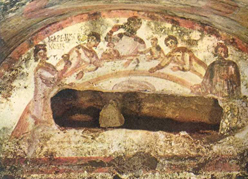Term Extensions "Culture"
In 14th century Britain, prisoners were given bread and water every other day. By the 18th century prisoners were fed 6 oz of bread—often stale—with breakfast, and 8 oz of bread with dinner and supper. Christians have a saying: man shall not live on bread alone but on every word that proceeds out of the mouth of God, but prisoners who suffered jail fever might disagree.
Bread is more than staple; it is also significance. Give us this day our daily bread. Bread is sustaining and sacramental. Bread makes up half the word companion: com (with) panis (bread).
In the West, bread has become a synonym for money. Until recently, it described a certain kind of man, as in the breadwinner who put bread on the table. If something is good, one might say it’s the best thing since sliced bread. For Indians bread is revered, elemental, like air. They say of the good life: roti kapra aur makan. Bread. Cloth. House.
Bread is prepared by cooking dough made from often—but not always—four ingredients: flour, water, salt, and yeast.
Yeast, is alive culture—belonging to the Kingdom Fungi. When you dump a small packet of Fleichmann’s yeast into a bowl, the yeast doesn’t look like much. It is oblong and tan. The granules wear jackets of dead cells. Add a little warm water though, and watch the grandules drop their jackets and start to jig. This is called proofing or cultivation; it is a necessary step for bread to rise.
Baking bread is about learning to feel; to feel when the dough is ready. This is one reason that baking bread is often considered a therapeutic treatment. Baking bread takes practice and especially failure.
Water, flour, yeast, salt. Elemental. Temperamental.
In the West we rarely make time to make bread anymore. Instead, we use the act of buying bread as a way to signal (like other purchases) where we fall on the conscientious consumer and health indexes: sprouted bread, flax bread, pumpernickel, whole wheat white, light honey whole wheat, gluten-free. Bread as class.
The Eucharist is a response to the early Christian communities’ desire to set aside work and obligation and gather as companions to eat lamb, wine, and bread. When we satiate our physical hunger, it is easier to turn our minds to the needs of others. In the beginning was the Word. Jesus was described as the Word of God in flesh, and this was the bread of life.
We are the wordkeepers and our classrooms are like communal tables wherein we offer through our own agape feast the opportunity to transform strangers into friends. Word : Bread : Yeast : Culture : to cultivate.
The exploratory nature of writing can help to dispel our mutual suspicions, to break open and better understand our clannish nature. The act of consumption is secondary to the act of communion. We should not let our students leave our classrooms as they entered them.
The university is a gathering, but are the ways we choose to contact and connect once we’re there meaningful? Sitting in a classroom for 16 weeks with a group of strangers and writing down the bone has the added benefit of making it very difficult to hate the other with impunity.
All the very worst in our world—terror, destruction, poverty—feeds off abstraction. Is this not why we demand our students to write clearly, concretely, to name the thing? Proximity disrupts our ability to cling to the belief that the other deserves to be sent back across the border, assaulted, devalued. There are few more effective ways to promote tolerance and shape culture than to share a meal, to break bread/Word together.
